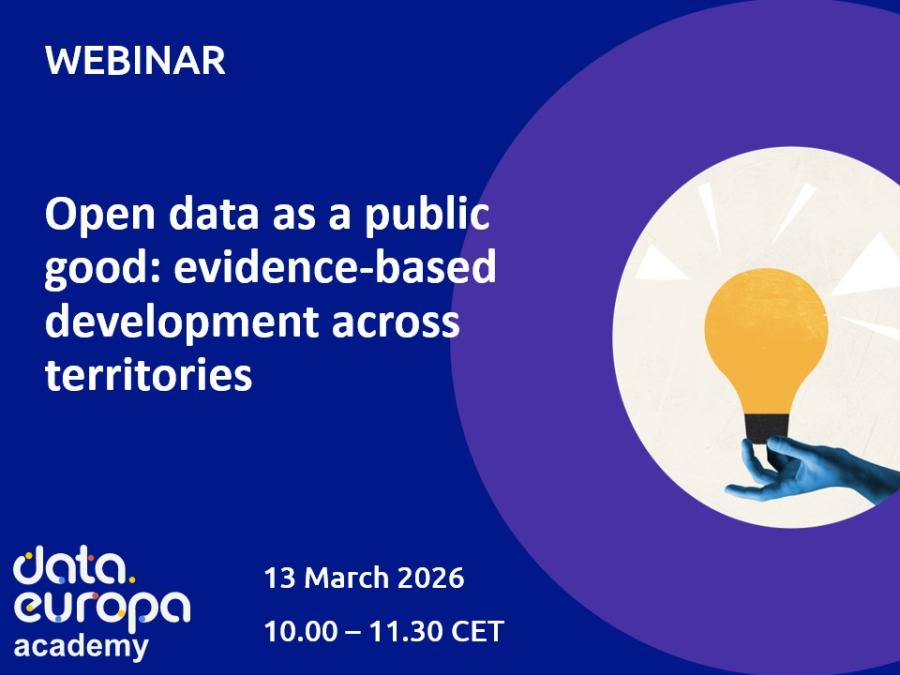L-Estonja
Blogs minn: L-Estonja
Skip results of view Country Insight Blogs




Open Data Market Size in Estonia Could Amount to 445 Million Euro by 2025
European Data Portal’s experts Esther Huyer and Laura van Knippenberg forecast that the market size of open data in Estonia could reach 445 million euro by 2025 if current growth continues. To harness the economic potential of open data, they recommend countries to increase collaboration between the public and private sectors, combine different types of data, and focus on improving the awareness and capacity of data reusers. They also encourage Estonia to undertake a more thorough study of the socio-economic impact of open data and exchange knowledge with other European countries. Esther Huyer

Local open data: Why and where to start?
When Brett Goldstein started his job as the City of Chicago’s Chief Data Officer in 2011, the city had already taken its first steps in publishing open data. It had an open data portal with some datasets, it had an open data community interested in engaging with the data, but overall not much progress was being made. Everything changed when, in the same year, a new mayor took office, for whom data-driven decision-making and opening up the city’s vast data resources to the public was a priority. Just a few years later, Chicago’s open data program had become a success story which has thereafter

Green revolution in economy is possible thanks to data
Transition to a green economy not only requires idealism and initiative but also data, data and more data. It was in the fall of 2019, around the same time the Swedish climate activist Greta Thunberg sailed around the world scorning world leaders for ignoring environmental problems, that the environmental initiative called Rohetiiger. took its first breaths in Estonia. Rohetiiger (Estonian for Green Tiger) is a broad-based collaboration platform seeking to boost the development of green economy. Among other plans, the platform wants to develop a system for data-driven assessment of products’

A new paradigm in cultural data: Focus on user needs instead of mass digitization
The year 2020 was special for cultural data and digital culture for several reasons. To the broader public this meant visiting exhibitions and theater plays virtually while sitting on their sofa due to the COVID-19 pandemic. From a narrower, policy-making perspective, 2020 marked the Year of Digital Culture – a policy initiative that aimed to promote new forms of culture driven by the use of digital technologies. As a result of this initiative, a report will be launched in January 2021 summarizing the state of Estonian digital culture and open cultural data. Based partly off of this report

Use cases in: L-Estonja
Skip results of view Use cases
Statistics Estonia provides several visualisations of economic figures for Estonia, Finland, Sweden, Germany, the Russian Federation, Latvia, and Lithuania. On the website, several graphs show actuals and trends of export and import products, trade balances, the destination and shipping countries of products.
Statistics Estonia provides several visualisations of economic figures for Estonia, Finland, Sweden, Germany, the Russian Federation, Latvia, and Lithuania. On the website, several graphs show actuals and trends of export and import products, trade balances, the destination and shipping countries of products.
Statistics Estonia provides several visualisations of economic figures for Estonia, Finland, Sweden, Germany, the Russian Federation, Latvia, and Lithuania. On the website, several graphs show actuals and trends of export and import products, trade balances, the destination and shipping countries of products.
Rapporti fi: L-Estonja
Skip results of view Dokumentazzjoni

Study
Data sharing as a service: will data services remove intellectual property rights from the picture, and at what cost?

Download
Avvenimenti ta’ Data Miftuħa fi: L-Estonja

Do you want to explore how open data can support better governance in rural areas and help policymakers respond to local needs beyond the city? Join us for the upcoming data.europa academy...
Bħalissa m’hemm l-ebda avveniment imminenti
Open Data News in: L-Estonja
Skip results of view L-Aħħar Aħbarijiet tad-Data Miftuħa





Estonia’s open data portal, avaandmed.eesti , is a comprehensive portal designed to provide unrestricted access to public sector data. Their initiative aims to enhance transparency , foster innovation , and support both commercial and non-commercial use of data. The portal offers a user- friendly interface where individuals and organisations can easily search, access, and utilise a wide range of datasets. The portal is structured to facilitate easy navigation and data retrieval of the 1900 datasets available . Users can browse datasets by categories such as environment , economy , and health

On Friday 16 February 2024, from 10.00 to 11.30 CET, the data.europa academy hosted the webinar ‘Open data maturity 2023: best practices across Europe‘ which highlighted Slovakia's and Serbia's accomplishments in the field of open data. With nearly 600 registrants, the event underscored the growing interest and commitment to open data across the continent. An expert from data.europa.eu initiated the session by presenting the ODM results , setting the stage for in-depth country analyses. Following this introduction, the narrative shifted to Serbia . In just two years, Serbia demonstrated

On 1 March 2024 , from 10:00 to 11:00 CET , our webinar on "New b usiness m odels for d ata- d riven s ervices" is set to provide fresh insights into the utilisation of open data. Th e event, building on the data.europa.eu discussion paper , aims to explore how public sector information, when made available as open data, can be purposefully re-used to creat e value for both public and private sectors . In recent years, the focus on open data has shifted towards understanding and meeting end-user needs. Th e webinar will examine the potential of open data in Europe, exploring how it can drive

This year marks the fifth anniversary of RescEU, an initiative by the European Commission that has strengthened disaster response mechanisms across Europe. Established to extend the EU Civil Protection Mechanism, RescEU embodies a deep commitment to protecting citizens from diverse disasters and managing emerging risks effectively. Since its launch in 2019, RescEU has served as a robust reserve of European capacities, fully funded by the EU. This includes a fleet of firefighting aircraft, medical evacuation planes, and critical medical supplies and field hospitals, ready to tackle health



